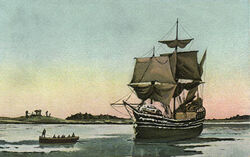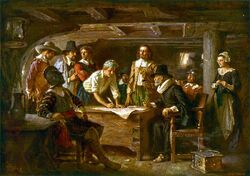Stephen Hopkins was born 29 April 1581 in Upper Clatford, Hampshire, England, United Kingdom to John Hopkins (1548-1593) and Elizabeth Williams (c1550-1582) and died 20 August 1644 Plymouth, Plymouth County, Massachusetts, United States of unspecified causes. He married Mary Kent (c1582-1613) 1605 in England. He married Elizabeth Fisher (1596-1638) February 1617 in London, Middlesex, England.
Mr Hopkins and his family were passengers on the 1620 Mayflower and early settlers of Plymouth Colony.
Baptised: "the last of April" 1581--Upper Clatford, England,
Vital Statistics
- Son of John Hopkins and Elizabeth Williams
- 1581 (Month and Day unknown) Born- Upper Clatford, Hampshire, England
- 1581 "at the last of April" Baptism/Christening-Upper Clatford, Hampshire, England
- 1609 Shipwreck of the Sea Venture
- 1620 Voyage of the Mayflower
- 1644-Jun-23 Death at Plymouth Colony
Biography

Stephen Hopkins (born about 1581 – 1644), was a tanner and merchant who was one of the passengers on the Mayflower in 1620, settling in Plymouth Colony. Hopkins was recruited by the Merchant Adventurers to provide governance for the colony as well as assist with the colony's ventures. He was a member of a group of passengers known to the Pilgrims as "The Strangers" since they were not part of the Pilgrim's religious congregation. Hopkins was one of forty-one signatories of the Mayflower Compact and was an assistant to the governor of the colony through 1636.
1609 Virginia Voyage
Hopkins had made a previous attempt to reach the New World in 1609 aboard the new flagship of the Virginia Company, the Sea Venture, on which Sir George Somers took the helm. Hopkins had embarked as a Minister's Clerk on the "Sea Venture", the Admiral of the Fleet. The ship was on the way to the Jamestown Colony in Virginia with much needed supplies when it was deliberately driven onto the reefs of Bermuda to prevent its foundering as a result of the damage it had sustained during a severe storm. All aboard, 150 passengers and crew and a dog, survived. The ship's longboat was fitted with a mast and sent to Virginia for help, but it and its crew were never seen again. Hopkins attempted to start a mutiny while stranded on the island. He was sentenced to death when this was discovered but was eventually set free after complaining of the "ruin of his wife and children". Hopkins and the remaining survivors spent nine months on Bermuda building two smaller ships, the Deliverance and Patience, from Bermuda cedar and materials salvaged from the Sea Venture. He and the other castaways eventually made their way to Jamestown, where Hopkins appears to have stayed for (some say) two years before returning to England. The Hopkins family is considered one of the First Families of Virginia.
Return to England
A report of the wreck of the Sea Venture and later events reached England. Most scholars believe that William Shakespeare based his play The Tempest on the report. It was first performed in November 1611. The play depicts the experiences of a group of passengers being shipwrecked by a mighty storm. A subplot involves a comic character called Stephano who tries to take over as leader on the island. It is possible that Stephano is based on Stephen Hopkins.
While he was away, Stephen’s wife Mary had survived by being a shopkeeper as well as receiving some of Stephen’s wages. But she unexpectedly died in May 1613, leaving her three young children all alone. By 1614, a letter arrived for a "Hopkins" in Jamestown and it is presumed that this is how he learned of her death, as he did return to England soon afterward to care for his children. Soon afterwards he married his second wife, Elizabeth Fisher (1596-1638).
Mayflower Voyage
He came to Plymouth Colony with two servants, Edward Doty (bef1600-1655) and Edward Leister (b 1600 -?). Also were his second wife, Elizabeth, sons Giles and Oceanus Hopkins (1620-1627) (born during the Mayflower voyage), and daughters Constance and Damaris. Damaris died in the early years, and Stephen then had another Damaris by his second wife. He is probably one of the dissenters at Plymouth, that forced the necessity of drafting the Mayflower Compact of which he is a signer. He was probably a leader of the non-separatists at Plymouth.

Mayflower at Provincetown Harbor
The Mayflower, originating from London with a group of Adventurers bound for the New World rendezvoused on 22 July with the Speedwell just arriving from Holland with a group of religious refugees from Leiden. Originally intended to sail jointly to the English Colony in Virginia it soon became evident that Speedwell was not seaworthy. Passengers and cargo were combined onto Mayflower (with many left behind) for the journey, finally departing on September 9.
During the voyage fierce storms blew the ship off course, arriving at Cape Cod on the Eastern Massachusetts coastline on November 9th. For two days they attempted to sail south to Virginia but exhausting supplies and fierce storms caused them to abort this effort and drop anchor at what is now Provincetown Harbor. On November 11th, the group decided to settle here and start their own colony. They wrote a governmental contract called the Mayflower Compact, Stephen was the 14th of the 41 signers on this document.

Signing the Mayflower Compact 1620, a painting by Jean Leon Gerome Ferris 1899
About the middle of December 1620, the ship moved and dropped anchor in Plymouth Harbor. All the while the pilgrims were conducting several exploring missions of the area and negotiations with the local natives. Almost half of the passengers died, suffering from an outbreak of a contagious disease described as a mixture of scurvy, pneumonia and tuberculosis. In the spring, they built huts ashore, and on March 21, 1621, the surviving passengers disembarked from the Mayflower into their new settlement at Plymouth, Massachusetts.
Indian Trader
Stephen Hopkins was a member of the early Mayflower exploratory parties while the ship was anchored in the Cape Cod area. As he was well-versed in the hunting techniques and general lifestyle of American Indians from his years in Jamestown Virginia, which was later found to be quite useful to the Pilgrim leadership.
The first formal meeting with the Indians was held at Hopkins’ house and he was called upon to participate in early Pilgrim visits with the Indian leader Massasoit. Over the years Hopkins' assistance to Pilgrims leaders such as Myles Standish and Edward Winslow regarding his knowledge of the local Indian languages was found to be quite useful.
Hopkins Plymouth Tavern
The Mayflower Quarterly of December 2011, in an article on Plymouth area taverns, has a paragraph on Stephen Hopkins, who kept an "ordinary" (tavern) in Plymouth on the north side of Leyden Street from the earliest days of the Colony.
The article defines a 17th-century "ordinary" as a term for a tavern where set mealtimes and prices were offered with terms such as inn, alehouse and tavern used interchangeably with ordinary in early Plymouth records.
Hopkins kept this tavern from the early Colony days until his death in 1644. In the early 1600s he had also had an alehouse in Hampshire with his wife Mary and his mother-in-law Joan, which they maintained after he left for America in 1609.
Marriage & Family
1st Marriage: Mary Kent
Mary Kent (c1582-1613). She died while Hopkins was on his first attempt to reach New World (1609-1615).
Stephen and Mary had three children:
- Elizabeth Hopkins (1604-1615) - b. England; she more than likely died before the Mayflower voyage.
- Constance Hopkins (1605-1677) - b. England, 1607; Mayflower passenger; married Nicholas Snow, who came to Plymouth on the ship Anne in 1623; died in Plymouth Colony, 1677.
- Giles Hopkins (1607-1690) - b. England, 1607/8; Mayflower passenger, married Catherine Whelden, daughter of Gabriel Whelden of Malden and Yarmouth
2nd Marriage: Elizabeth Fisher
Elizabeth Fisher: married Stephen Hopkins at St. Mary Matfellon, Whitechapel, London, on 19 February 1617/8, and was a Mayflower passenger who died in Plymouth, 1639.
Stephen and Elizabeth had seven children:
- Damaris Hopkins (1618-1627) - b. England, 1618; Mayflower passenger - died young in Plymouth Colony.
- Oceanus Hopkins (1620-1627) b. He was the only child born on the Mayflower. He had died by 22 May 1627.
- Caleb Hopkins (1622-bef1651) b. was born in Plymouth about 1624. He became a seaman and died at Barbados between 1644 and 1651.
- Deborah Hopkins (1625-1666) b. Plymouth, 1626, married Andrew Ring (1617-1693), son of William and Mary Ring
- Damaris Hopkins (1628-1669) born in Plymouth about 1627-8 and died in Plymouth between January 1665/6 and 18 November 1669. , married Jacob Cooke, son of Pilgrim, Francis Cooke and Hester Mayhieu (and had 7 children)
- Ruth Hopkins (1630-1651) about 1630 and died in Plymouth between 30 November 1644 and spring 1651. She was unmarried.
- Elizabeth Hopkins (1632-bef1659)was born in Plymouth about 1632 and probably died before 6 October 1659. She was unmarried.
Children
| Name | Birth | Death | Joined with |
| Elizabeth Hopkins (1604-1615) | 13 March 1604 Hursley, Hampshire, England | 12 May 1615 Hursley, Hampshire, England | |
| Constance Hopkins (1605-1677) | 11 May 1605 Hampshire, England, United Kingdom | 25 November 1677 Eastham, Massachusetts, United States | Nicholas Snow (1599-1676) |
| Giles Hopkins (1607-1690) | 1607 Hursley, Hampshire, England | 26 April 1689 Eastham, Barnstable County, Massachusetts | Catherine Whelden (1617-1689) |
Siblings
Mayflower Servants
- Edward Doty (bef1600-1655), age probably about 21, survived and has a great posterity living today.
- Edward Leister (c1598-) also spelled Leitster. (Kensington), aged over 21, servant to Stephen Hopkins and eventually moved to Virginia. These two servants fought a nasty duel with each other in 1621.
Vital Records
Bradfords Passenger List
From Gov Wm Bradfords 1651 record of Mayflower passengers:
Mr. Steven Hopkins, and Elizabeth, his wife, and 2 children, caled Giles, and Constanta, a doughter, both by a former wife, and 2 more by his wife, caled Damaris and Oceanus; that last was borne at sea; and 2 servants caled Edward Doty and Edward Lister.
Mr. Hopkins and his wife are now both dead, but they lived above 20 years in this place, and one sone and 4 doughters borne here. Ther sone became a seaman, and dyed at Barbadoes, one daughter dyed here, and two are maried; one of them hath 2 children; and one of them is yet to mary. So their increase which still survive is 5; But his sone Giles is maried and hath 4 children. His daughter Constanta is also maried and hath 12 children, all of them living, and one of them maried.
Edward Doty and Edward Lister, the servants of Mr Hopkins. Litster, after he was set at liberty, went to Virginia, and ther dyed. But Edward Doty, by a second wife hath 7 children, and both he and they are still living.
References
- Caleb Johnson, Here Shall I Die Ashore: Stephen Hopkins, Bermuda Castaway, Jamestown Survivor, and Mayflower Pilgrim (Xlibris, 2007) ISBN 978-1-4257-9638-9.
- Caleb Johnson, The American Genealogist 73:161-171, “The True English Origins of Stephen Hopkins of the Mayflower”, July 1998. His first wife was not Constance Dudley, though this erroneous name is given by older references.
- Mayflower Families Through Five Generations, Volume Six, Third Edition, Stephen Hopkins ISBN 0-930270-03-7
- Immigrant Ships To America/First Families/Mayflower
- wikipedia:en:Stephen Hopkins (Mayflower passenger)
- Here Shall I Die Ashore: STEPHEN HOPKINS: Bermuda Castaway, Jamestown Survivor, and Mayflower Pilgrim. - Amazon Books -
- Stephen Hopkins Biography - McCarter Family Genealogy - great biographical article.
- Stephen Hopkins of the Mayflower
- Stephen Hopkins First encounter marker
- MayflowerHistory.com page on Stephen Hopkins
- Stephen Hopkins in the Records of the 17th Century
- Last Will and Testament of Stephen Hopkins at The Plymouth Colony Archive Project
- Stephen Hopkins (1581-1644)/List of Famous Descendants